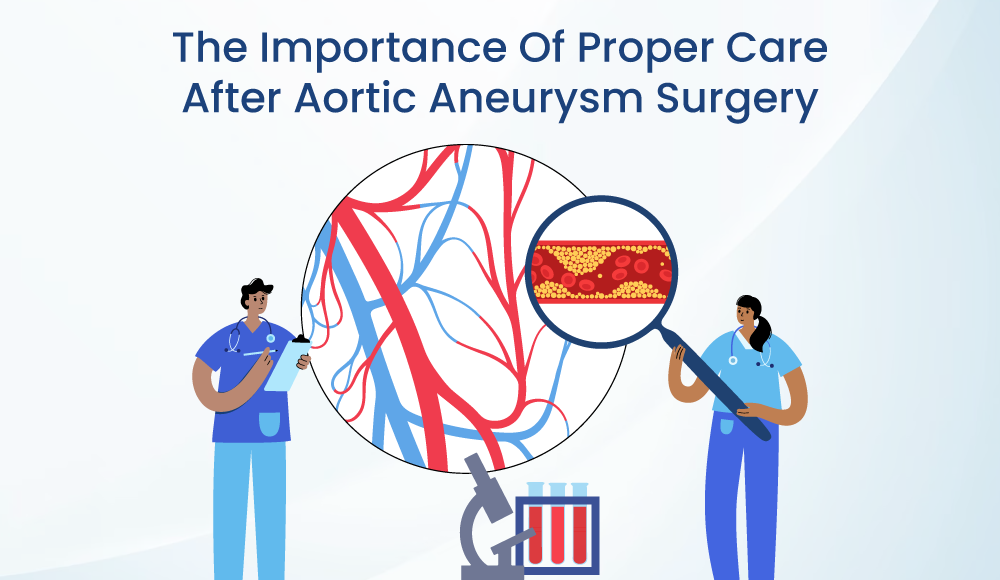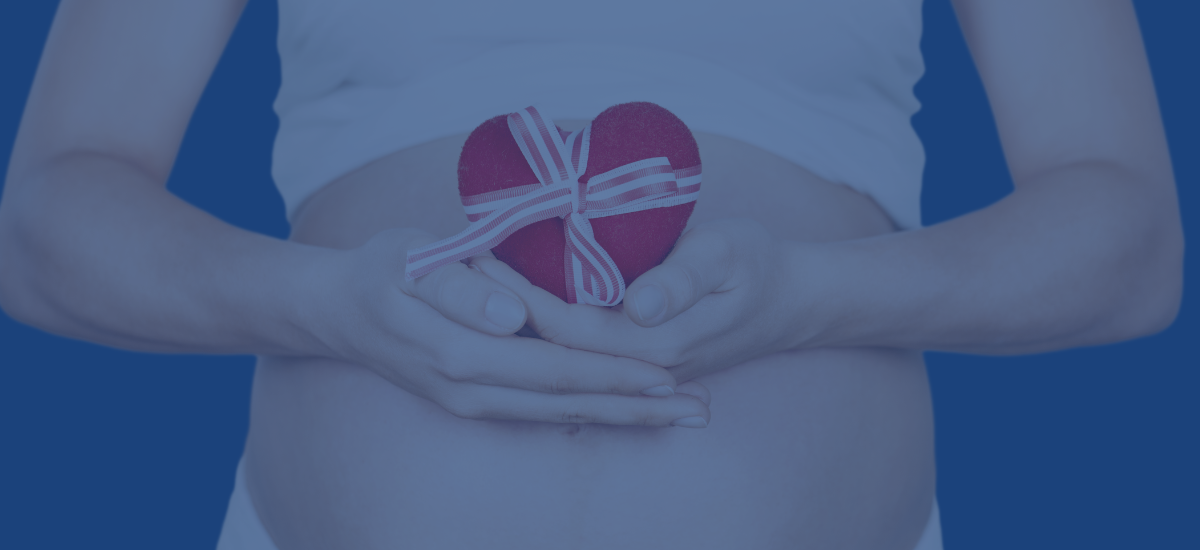
An aortic aneurysm refers to a heart condition in which the walls of the aorta, the body’s largest artery, is weakened and bulges outward. Aorta is the primary artery that carries blood & oxygen from your heart to other body parts. The aorta has thick walls to withstand normal blood pressure. But certain medical conditions can compromise or impair the structural integrity of these walls, causing aneurysm. This occurs when the blood exerts pressures against the weakened walls, causing them to bulge outwards.
An aortic aneurysm surgery can help fix these weakened or damaged walls by either repairing them or replacing them. It, therefore, prevents an aneurysm from rupturing.
After aortic aneurysm surgery, you are going to need to follow proper aftercare. Following the doctor’s guidance and proper after care measures can help you recover quicker.
Our guide shares tips on care after aortic aneurysm surgery and how it is important to not only recover quicker but to also lead a healthy life post surgery.
Book an appointment with our post-operative care team for your aortic aneurysm surgery recovery
Post-Operative Care After Aortic Aneurysm Surgery
Generally, it takes at least 2-3 weeks to recover after aortic aneurysm surgery. The medical team will continue to monitor your health to prevent complications through the recovery period.
1. Hospital Stay
Post-aortic aneurysm surgery, you will be moved to an intensive care unit (ICU). Your condition requires close monitoring for a few days, after which you will be moved to a regular room. The duration of the hospital stay can last between 3 to 10 days. In most cases, this stay is included in the Aortic Valve replacement cost; however, always make sure to confirm this with your doctor as well as your insurance provider.
The hospital care is likely to include the following provisions:
- Frequent monitoring of BP and heart rate
- Pain-killers and blood-thinning medicines
- Urinary catheter to help you pass urine
- Breathing machine to support normal breathing
- Tube to drain fluids
- Compression socks to prevent blood clots in legs
Your body requires adequate rest after any major surgery. So, avoid exerting yourself too much until you make a full recovery.
2. Monitoring for Complications
Every major surgery has complications, and this case is no different. It is important to be aware of all risk factors & complications. They are:
- Bleeding.
- Formation of blood clots.
- Reduced blood flow to legs, kidneys, bowels, etc., during surgery can cause injuries to these organs.
- Heart problems like heart attacks or arrhythmia.
- Breathing problems.
- Infection in the graft.
- Infection in the lungs & urinary tract.
- Damage to kidneys.
- Spinal cord injury.
The risk factors may vary from patient to patient. So, you need to discuss this with your trusted cardiovascular surgeon in Mumbai. They can help advise you on what complications can arise based on your specific health condition.
3. Pain Management
Effective management of pain is critical during the recovery time after aortic aneurysm surgery. Your doctors will prescribe medicines for pain relief while you are recovering at home. So, carefully make a note of the time and dosage for taking these medicines. Follow the prescription as recommended by your doctors to ensure you recover quicker.Excess dosage may only increase the complications. Specific instructions may be given by your medical team based on your condition.
4. Wound Care
The surgical wound left after an aortic aneurysm surgery requires special care and attention to heal completely as you recover. Please follow your doctor’s instructions to know how to take proper care.
- You may need a change of dressing every day. You might have to visit your doctor to change the dressing.
- You need to consult with your doctor before removing the bandages, even for taking a shower.
- You might experience some pain & discomfort when you cough or sneeze.
- Hug a soft pillow against the incision whenever you want to cough or sneeze.
These wound care tips will help protect the wound and speed up its healing.
5. Medications
Your doctors may prescribe a few medicines post aortic aneurysm surgery. It is essential to take the medication exactly as prescribed to avoid any kind of complication and to speed up your recovery.
You should discuss your medications with your aortic aneurysm surgeon in Mumbai, they’ll offer you professional guidance and it is necessary to follow their guidance.
Your surgeon may recommend one or more of the following list of medicines:
- Aspirin is helpful in controlling and managing cardiovascular risk factors. But please note that it can increase the risk of bleeding.
- Statins can control cholesterol levels and reduce blockages in the arteries.
- Medicines like beta blockers, angiotensin-converting-enzyme (ACE) inhibitors, and angiotensin-receptor-blockers (ARB) are prescribed to control blood pressure.
6. Recovery and Rehabilitation
Most people require anywhere between three to ten days of hospital stay for recovery. You may also need rehabilitation care after aortic aneurysm surgery. This can help you quickly regain your strength and independence.
Your doctor might recommend moderate aerobic exercises like brisk walking and light cycling for about three to five times a week is beneficial. And you’ll be advised to avoid any kind of heavy or high-intensity activity.
It is important that you stay with your family during the recovery period. If you are alone, you should hire a caregiver, who can provide you with the help, support, and motivation you might need during your recovery.
7. Follow-Up Appointments
Regular monitoring is a must for people living with an aortic aneurysm.
- Follow-up appointments help your doctors identify the risk factors, such as aortic aneurysm after surgery.
- Other signs, such as sudden pain or fever after surgery, can indicate a graft infection.
You should seek immediate medical attention and contact an expert if you experience signs and symptoms such as low BP, rapid heart rate, fainting, or sudden severe pain in your chest or abdomen.
You can also read our guide, heart valve repair surgery cost in Mumbai, for more information.
8. Lifestyle Changes
The post-aortic aneurysm surgery lifestyle requires a few changes, as listed below.
- Eat food that is healthy for your heart. Reduce sugar, salt, and saturated fat from your diet.
- Drink lots of water and stay hydrated.
- Curb your smoking as it is very harmful to your heart
- Regular moderate exercises are highly beneficial
- Other health conditions such as diabetes, high BP, and high cholesterol should be managed well with suitable medications
You can also read our guide 9 healthy lifestyle changes to embrace a healthy lifestyle post heart surgery!
Book an appointment with our post-operative care team for your aortic aneurysm surgery recovery
Conclusion
To summarize, an active and healthy lifestyle can protect your heart and prevent aortic aneurysms. Regular screenings can detect the risk factors and help you seek timely medical intervention. Furthermore, emergency medical care is a must for a ruptured aneurysm.
Though most people recover fully, proper care after aortic aneurysm surgery is essential to avoid health complications in the future. Speak to your doctors about the lifestyle changes that you need to make after the surgery.
If you want to read surgery aftercare tips for aortic valve replacement, read our guide featuring: 5+ Effective Tips For Aortic Valve Replacement Aftercare.



[…] While unfortunately, there is no aneurysm cure, early detection and appropriate treatment significantly reduce the chances of complications and the need for aneurysm surgery. Even after undergoing surgery, it is crucial to maintain diligent postoperative care and follow the recommended aftercare instructions. […]
[…] in higher expenses for room charges, nursing care, and other amenities. Refer to our blog about proper care after aortic aneurysm surgery, to learn about its […]
[…] Learn how proper care after aortic aneurysm surgery can help you quickly bounce back and regain your normal life post surgery. […]